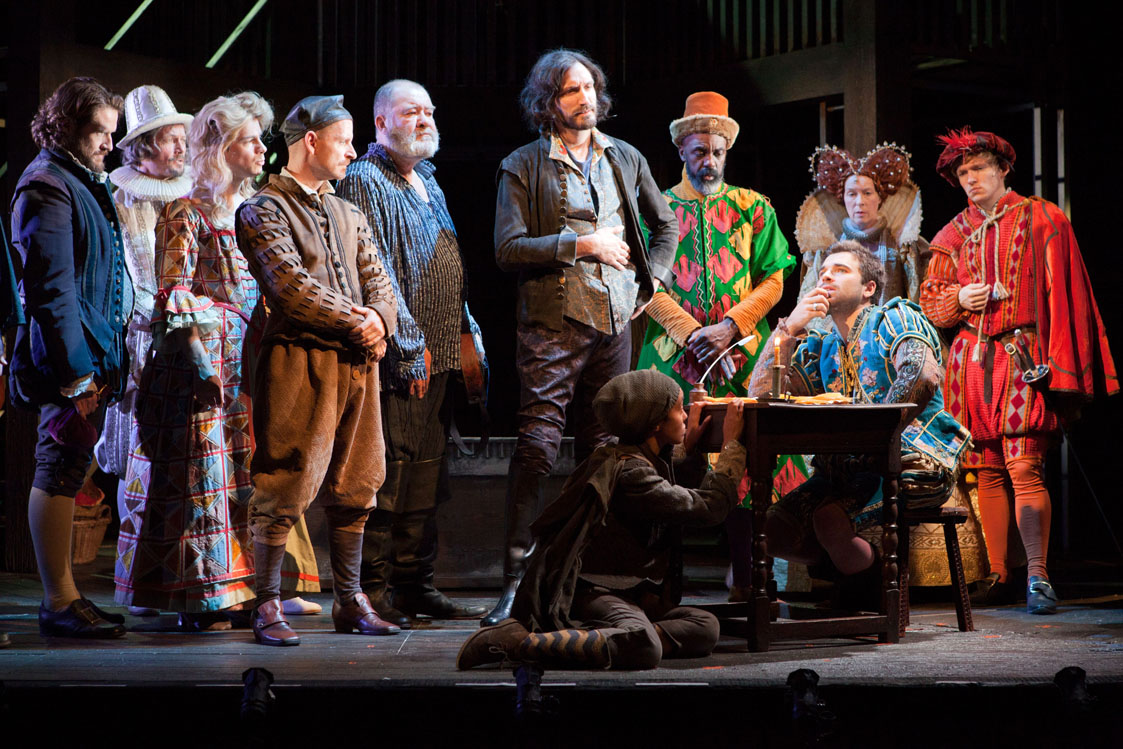
The witty wordplay of Stoppard is always something to look forward to. His playful anachronisms and deftly placed Shakespearean quotes litter the stage for those with a tuned ear. They were, one suspects, no small reason for the success of the film which is progenitor to this stage version.
Whilst Shakespeare’s position as literary icon remains unshaken this is no mere exercise in hagiolatry. Shakespeare, as the play kicks off, is a writer with a missing mojo, unable even to turn out a piece of doggerel. His saviour is the accomplished and fêted Kit Marlowe who in one scene reminiscent of Cyrano de Bergerac feeds him words of seduction as he woos the apparently unattainable Viola de Lesseps (Imogen Daines). As we know the path of true love is never smooth. The theatre loving daughter of a low born, but successful merchant, Viola now finds herself packaged up as part of a deal designed to elevate her family’s social status whilst salvaging the fortunes of her intended, the spendthrift and calculating, Lord Wessex (Bill Ward).
The theatrical company politics are recognisable down to our own day: Edward Alleyn (Rowan Polonski) is an elegant and charismatic ‘luvvie’ whilst Richard Burbage (Edward Harrison) has an ego the match of any Hollywood A-lister. The best parts are always the focus of rivalry and jealousy in a profession which has always favoured a tough mental constitution.
Shakespeare himself (Pierro Niel-Mee) seems to be almost as much in love with love as with Viola and is found, all too human, producing some of his best work out of pain. The romantic fantasy of a love across the social divide runs aground on the rocky realities of Elizabethan social norms – not to mention a wife and three children back in Warwickshire. It’s not a traditional happy ending, but at least one of equilibrium. Honour, art, society and business are all satisfied with only love being the loser.
There is a lot going on in the play – perhaps a function of having three credited playwrights, messrs. Norman, Stoppard and Hall – and a result on the stage, where the audience’s attention is free to roam at will, the narrative drive to carry the romantic plot is too easily diverted.
Lifting a story from the screen onto the stage presents its own problems. Director, Phillip Breen sets off, best foot forward, with some theatrical storytelling in the problem centred, ‘How do we do this?’, style with which the production starts as ‘the public’ crane their necks to hear the next verbal gems from a rising star. Again the ferry scene with designer, Max Jones’s, balconied revolve turning to give the impression of the (static) boat sliding along the Thames is beautiful stagecraft. However, moments like this have to contend with the realism imported from the screen version. Whilst not jarring it nonetheless nudges the play away from the total theatrical solution an unbeholden script might have suggested.
Paddy Cunneen’s score adds colour, light and atmosphere – QEI (Geraldine Alexander) gets the star treatment for her entrance in act two. And then of course there is Shakespeare, who, whenever he appears in his own voice manages to stab one through the heart
This Bath Theatre Royal co-production with Eleanor Lloyd Productions, sets off on the road and will undoubtedly reach and charm audiences other Shakespeare cannot reach.
★★★☆☆ Graham Wyles 10th October 2018
Production photo by Pete Le May

